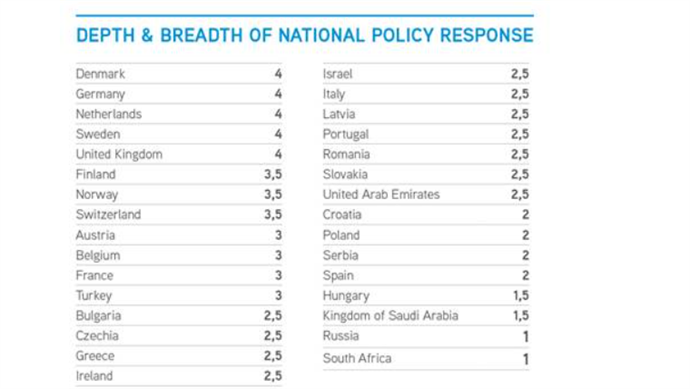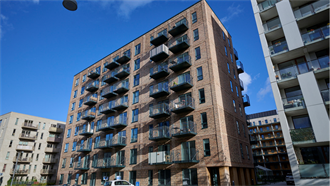The Danish, German, Dutch, UK and Swedish governments are responding best to the Covid-19 crisis in terms of business support measures, while South Africa and Russia have done the least so far, according to a new report issued by Colliers International.
Colliers’ Covid-19 European Real Estate Markets Government Response report looks specifically at how national governments across EMEA are supporting businesses in terms of commercial and residential rent/mortgage relief, business loans and grants, taxation allowances and business rates and household/individuals salaries. Force majeure impact on lease contracts is also considered.
Markets are ranked on a scale from zero to five, based on the depth and breadth of support, where a score of five represents the highest level of government support, down to zero where no formal government support has been provided or announced to date.
‘A number of countries have really stepped up to support their national economies and stakeholders,’ says Damian Harrington, Colliers’ head of EMEA Research. ‘For some countries, this has been slightly easier given the infrastructure already in place, such as in Germany and countries across the Nordics, particularly when it comes to supporting income levels through existing welfare systems. The swift adoption of furloughed workers policies in the Netherlands and the UK has helped moved these countries to the top of the rankings, on top of the other levels of support on offer.’
Direct government support for occupiers and/or landlords with their commercial rents/mortgages has proven to be very limited to date. Only in the Netherlands have some banks agreed to provide commercial mortgage holidays to landlords for up to 6 months at present.
In Italy, Austria and Greece the government has provided some support to the most impacted retail tenants in the form of rent subsidies and tax credits. In Russia, only government-owned property is to benefit from support with regards to commercial leases and mortgages.
In France, the UK and Germany new Covid laws have been passed to prevent any eviction of tenants for non-payment of rent during the emergency, lockdown period. Similar policies are in place in Turkey and Hungary. In the UK and Germany this has also been extended to the residential sector.
Additionally, the UK government is supporting banks to allow three-month residential mortgage payment deferrals; a similar, selective approach has been adopted in Finland and Russia. Greece is supporting employees in affected companies, with a corresponding 40% reduction of their residential rent for two months.
Perhaps the most important government support and intervention has been with regard to supporting households/individual incomes in the face of such a stark slowdown in economic activity. The governments most supporting businesses through salary support for furloughed workers include the Dutch, UK, Austrian, Latvian, German and Nordic governments, with the Dutch proving the most generous by supporting up to 90% of salaries.
The UK and Austria are not far behind by offering up to 80%, and this include support for the self-employed. Germany has a well-established system of support where the government will pay 67% of salaries including payroll taxes for 12 months, with three-month payroll grants of €15,000 available to the self-employed and small companies. The Nordics are close behind, providing immediate unemployment benefit support, or specific new short-term layoff support worth around 65% of gross salaries.


































